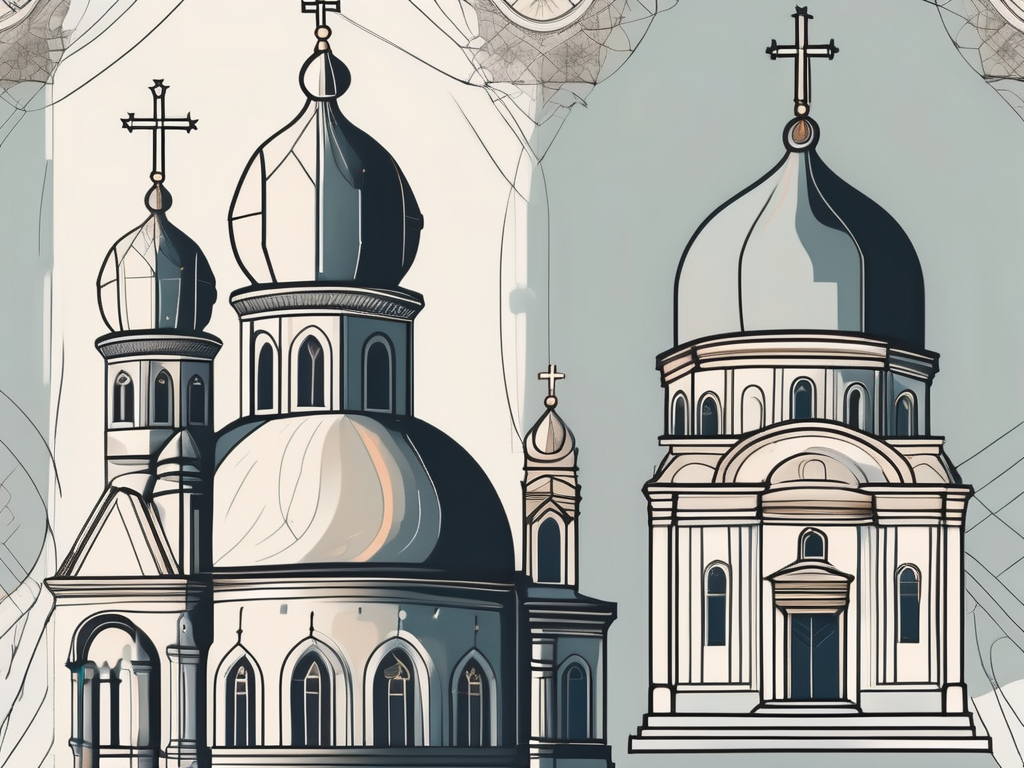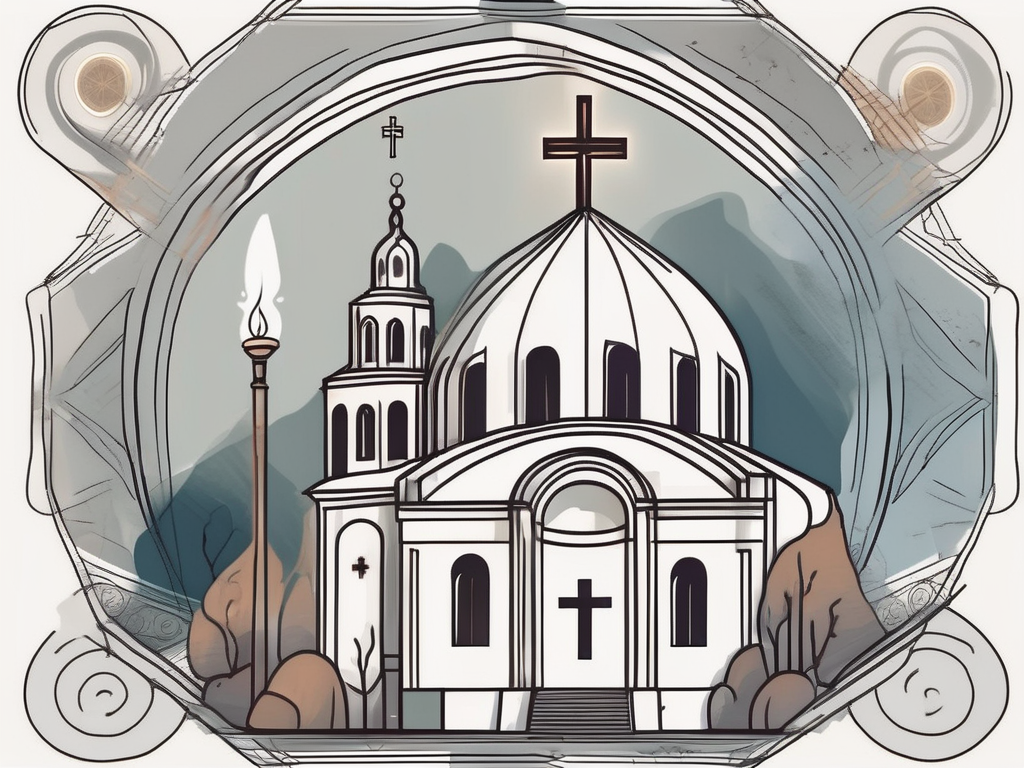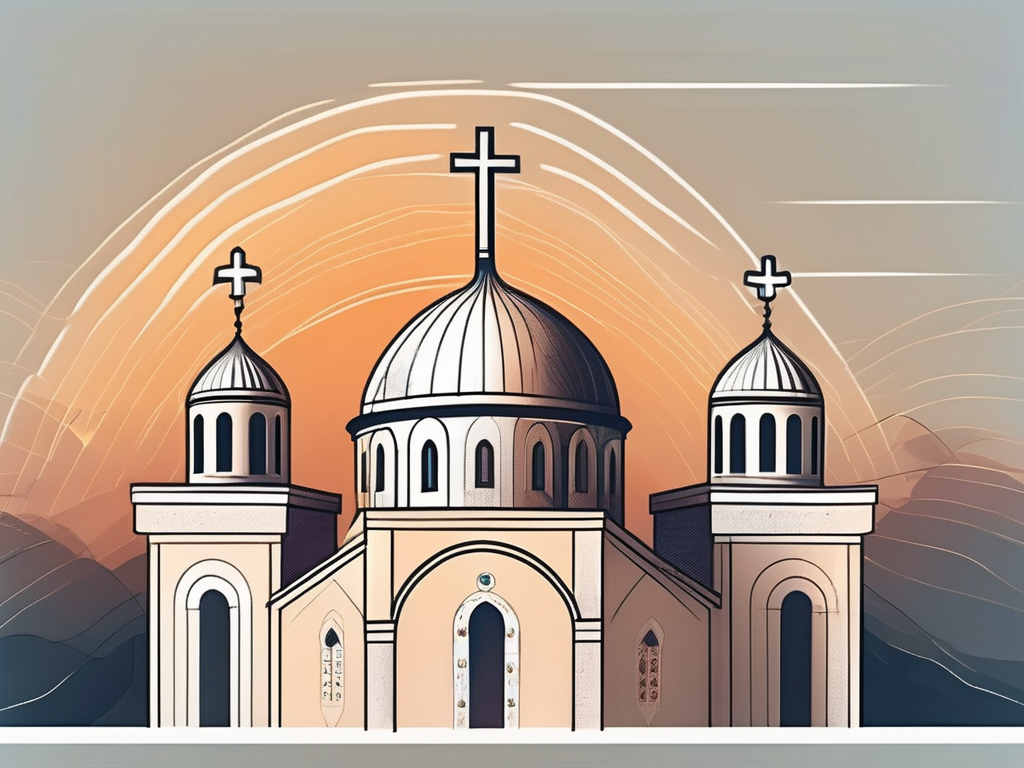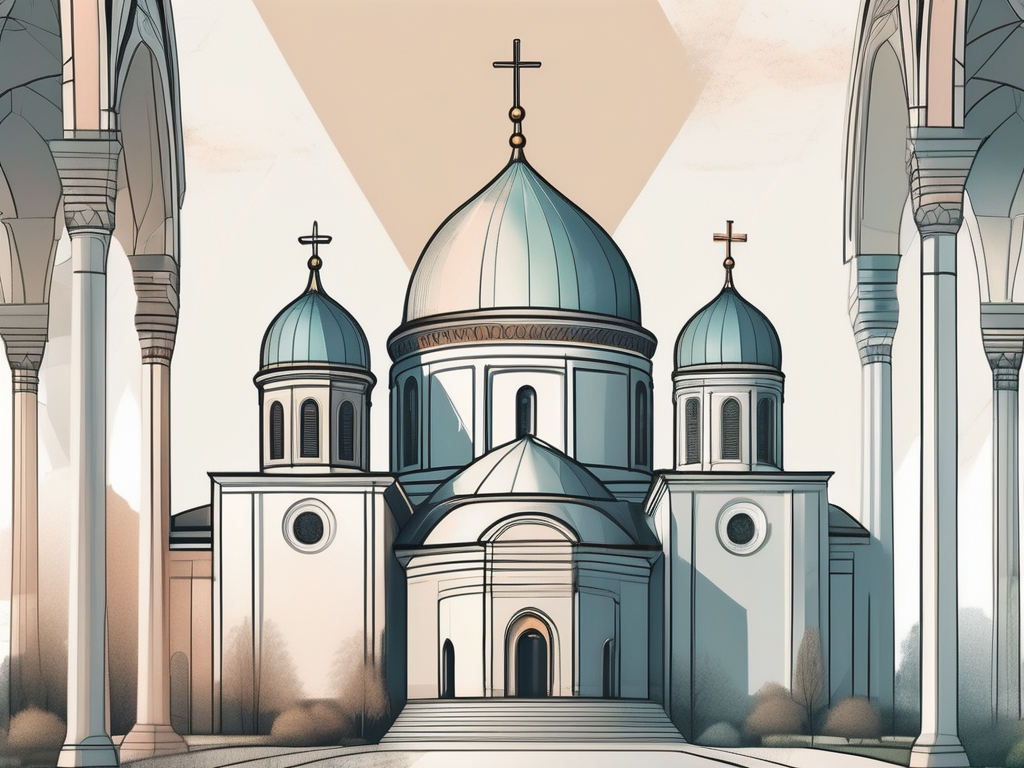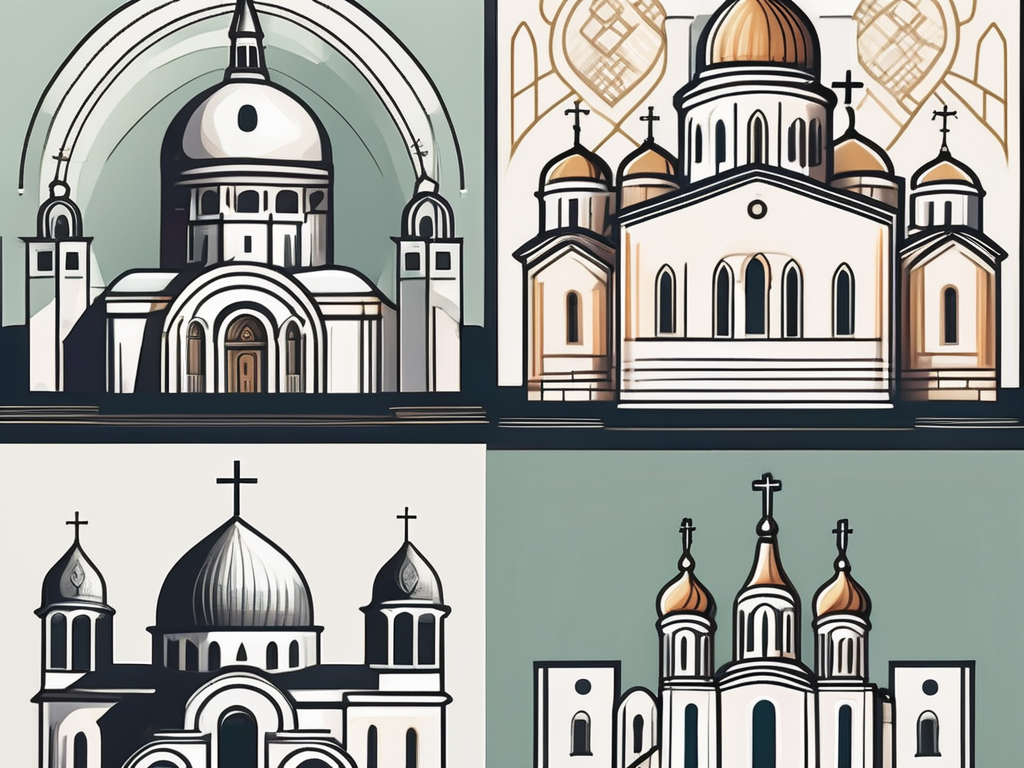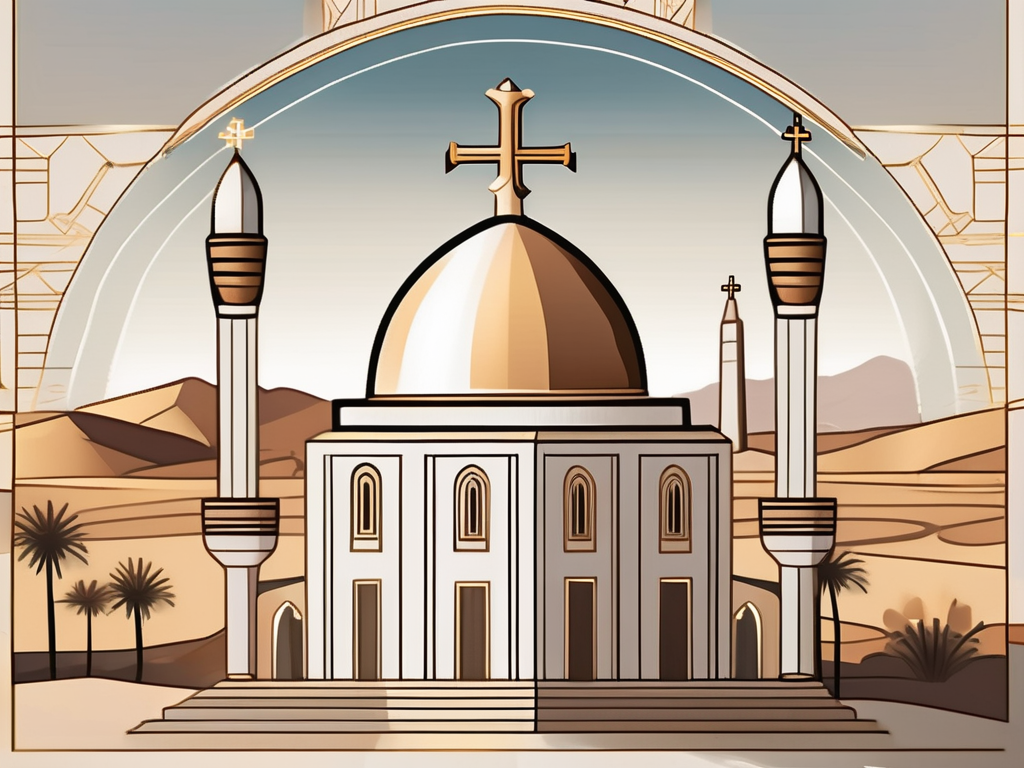The Greek Orthodox Church is one of the oldest Christian denominations in the world, with a rich history and a set of unique beliefs and practices. In this article, we will explore the key aspects of Greek Orthodox beliefs, understanding the church, the role of the Bible, worship and practices, the church hierarchy, and its relationship with other Christian denominations.
Understanding the Greek Orthodox Church
The History of the Greek Orthodox Church
The Greek Orthodox Church traces its roots back to ancient times, with its origins in the early Christian community in Greece. It holds a deep connection to the Byzantine Empire, playing a significant role in shaping the religious, cultural, and political landscape of the region.
Ancient Greece, known for its rich mythology and philosophical traditions, provided a fertile ground for the spread of Christianity. As the teachings of Jesus Christ reached the shores of Greece, they resonated with the Greek people, who were already accustomed to seeking spiritual enlightenment and truth.
Throughout its history, the Greek Orthodox Church has faced numerous challenges, including periods of persecution and political turmoil. The Byzantine Empire, with its capital in Constantinople (modern-day Istanbul), became a stronghold of Orthodox Christianity. However, the empire faced external threats from various invaders, such as the Persians and the Ottoman Turks.
Despite these challenges, the Greek Orthodox Church remained resilient, preserving its traditions and teachings for over centuries. It became a beacon of hope and a symbol of Greek identity, providing spiritual guidance and a sense of unity during times of adversity.
Key Principles and Beliefs of the Greek Orthodox Church
The Greek Orthodox Church adheres to a set of fundamental principles and beliefs that guide its members’ lives and spirituality.
One central belief is the Holy Trinity, the understanding that God is one essence yet exists in three persons: the Father, the Son (Jesus Christ), and the Holy Spirit. This concept, deeply rooted in the teachings of the early Church Fathers, highlights the complex nature of God and His relationship with humanity.
The Greek Orthodox Church places a strong emphasis on the incarnation of Christ, his crucifixion, and resurrection. These events are seen as pivotal moments in human history, representing God’s love and sacrifice for humanity’s salvation. The iconography and liturgical practices of the Church vividly depict these events, inviting believers to reflect on their significance.
Additionally, the Church emphasizes the importance of salvation through faith, repentance, and sacraments like baptism and communion. Baptism is seen as the initiation into the Christian faith, marking the beginning of a lifelong journey towards spiritual growth and communion with God. Communion, also known as the Eucharist, is considered the central sacrament of the Church, where believers partake in the body and blood of Christ.
The concept of theosis, or divinization, is also significant in Greek Orthodox theology. It teaches that believers are called to participate in the divine nature and become more like God by cultivating virtues and growing in holiness. This transformative process involves prayer, fasting, acts of charity, and the pursuit of spiritual enlightenment.
Furthermore, the Greek Orthodox Church places great importance on the intercession of saints and the veneration of icons. Saints are seen as spiritual guides and intercessors, who can pray on behalf of believers and offer guidance in their spiritual journey. Icons, considered windows to the divine, serve as visual representations of the heavenly realm and aid in focusing one’s thoughts and prayers.
In conclusion, the Greek Orthodox Church is a rich and ancient Christian tradition that has played a significant role in the history and culture of Greece. Its teachings and practices offer a profound understanding of the nature of God, the importance of salvation, and the path to spiritual growth. Through its resilience and unwavering commitment to its beliefs, the Greek Orthodox Church continues to inspire and guide its followers in their quest for a deeper connection with the divine.
The Role of the Bible in Greek Orthodox Beliefs
Interpretation of the Holy Scriptures
The Greek Orthodox Church interprets the Holy Scriptures in a context deeply rooted in tradition and the teachings of the early Church Fathers. This approach to Scripture interpretation emphasizes a holistic understanding of the Word of God, considering historical, linguistic, and theological factors, while always guided by the Holy Spirit.
Within the Greek Orthodox tradition, the Bible is not viewed as a standalone authority but rather in conjunction with the Holy Tradition. The Holy Tradition includes the teachings, practices, and interpretations passed down through the generations. This rich tapestry of tradition provides a framework for understanding and applying the Scriptures in the life of the Church.
When interpreting the Bible, Greek Orthodox Christians take into account the historical and cultural context in which the texts were written. They study the original languages, such as Greek and Hebrew, to gain a deeper understanding of the nuances and meanings of the words used. This linguistic analysis allows them to uncover the intended message of the Scriptures.
Furthermore, the Greek Orthodox Church places great importance on the teachings of the early Church Fathers. These revered theologians and spiritual leaders of the early centuries of Christianity provide valuable insights into the interpretation of the Scriptures. Their writings and commentaries serve as a guide for understanding the deeper spiritual truths contained within the Bible.
Overall, the Greek Orthodox approach to Scripture interpretation is a dynamic and multifaceted process that seeks to uncover the timeless wisdom and truth contained within the Holy Scriptures.
The Importance of the New Testament
The New Testament holds immense importance in Greek Orthodox beliefs as it contains the life, teachings, and redemptive work of Jesus Christ. Within the pages of the New Testament, Greek Orthodox Christians find the foundation of their faith and the source of their spiritual nourishment.
The Gospels, in particular, are highly revered in the Greek Orthodox Church. These four accounts of the life of Jesus Christ, written by the apostles Matthew, Mark, Luke, and John, provide detailed and intimate portraits of Christ’s ministry, miracles, and interactions with individuals from all walks of life.
Through the Gospels, Greek Orthodox Christians gain insight into the compassionate heart of Jesus, His teachings on love, forgiveness, and the Kingdom of God. They find guidance and inspiration from passages such as the Sermon on the Mount, where Jesus teaches about the Beatitudes and the principles of righteous living.
Moreover, the Parables of Jesus, found throughout the Gospels, offer profound spiritual lessons and moral teachings. These stories, often using familiar imagery and everyday situations, convey deep truths about the nature of God’s Kingdom and the values that should guide the lives of believers.
The New Testament also contains the Acts of the Apostles, which chronicles the early spread of Christianity and the establishment of the early Christian communities. Greek Orthodox Christians draw inspiration from the courage, faith, and dedication of the apostles and early believers as they faced persecution and spread the message of the Gospel.
Additionally, the Epistles, written by the apostles to various early Christian communities, provide practical guidance for living a faithful life and navigating the challenges of the world. These letters address theological issues, ethical concerns, and offer encouragement and exhortation to persevere in the faith.
In conclusion, the New Testament holds a central place in Greek Orthodox beliefs, serving as a source of spiritual nourishment, guidance, and inspiration for the faithful. It is through the life, teachings, and redemptive work of Jesus Christ as recorded in the New Testament that Greek Orthodox Christians find the path to salvation and the fullness of life in communion with God.
Greek Orthodox Worship and Practices
The Greek Orthodox Church has a rich and vibrant tradition of worship and practices that are deeply rooted in its history and theology. One of the central worship services in the Greek Orthodox Church is the Divine Liturgy, which holds great significance for the faithful.
The Divine Liturgy
The Divine Liturgy is a reverent and participatory experience where the faithful gather to partake in the Eucharist and receive the body and blood of Christ. It is a profound moment of communion with God and fellow believers.
During the Divine Liturgy, prayers, hymns, and readings from the Scriptures are recited, creating an atmosphere of devotion and spiritual connection. The liturgical texts are carefully chosen to reflect the teachings of the Church and to guide the faithful in their journey of faith.
The priest plays a significant role in leading the liturgy, acting as a mediator between the congregation and God. With reverence and solemnity, the priest offers prayers on behalf of the people and performs the sacred rituals that bring the faithful closer to the divine presence.
Moreover, the congregation actively engages in the Divine Liturgy through responses and participation in sacraments. The faithful offer their prayers, sing hymns, and make prostrations as acts of worship and devotion. This active participation fosters a sense of unity and communal worship.
Sacraments and Rituals
The Greek Orthodox Church recognizes seven sacraments, which are seen as outward signs of inward grace. These sacraments include baptism, confirmation (chrismation), the Eucharist, confession (reconciliation), marriage, Holy Orders (ordination), and anointing of the sick (unction).
Each sacrament is celebrated within the framework of rich rituals and ceremonies, symbolizing the believers’ initiation, spiritual growth, and sanctification. These rituals are deeply rooted in the teachings and traditions of the Church, carrying profound spiritual significance for the faithful.
For example, baptism is a sacrament that marks the entrance into the Church and the beginning of a person’s Christian journey. Through the pouring or immersion in water, the individual is cleansed of original sin and receives the gift of the Holy Spirit.
Marriage, another sacrament, is a sacred union between a man and a woman, blessed by God and witnessed by the Church. The wedding ceremony is filled with symbolic gestures, prayers, and blessings, reflecting the sacredness of the marital bond.
Furthermore, the Eucharist, also known as Holy Communion, holds a central place in the life of the Greek Orthodox Church. It is the sacrament in which the faithful partake of the consecrated bread and wine, believing it to be the body and blood of Christ. This act of communion with Christ and fellow believers is considered a source of spiritual nourishment and unity.
In conclusion, Greek Orthodox worship and practices are deeply rooted in tradition, scripture, and the teachings of the Church. The Divine Liturgy and the sacraments provide opportunities for the faithful to connect with God, deepen their faith, and experience the transformative power of the divine presence.
The Greek Orthodox Church Hierarchy
The Role of the Patriarch
The Greek Orthodox Church is led by the Ecumenical Patriarch, who serves as the spiritual leader and symbolic head of the Church. The Patriarch holds a position of honor and acts as a unifying figure for the Greek Orthodox faithful worldwide.
While the Patriarch is based in Istanbul, Turkey, his influence extends beyond geographical boundaries, guiding and providing pastoral care to millions of Greek Orthodox Christians globally.
Clergy and Laity in the Greek Orthodox Church
The Greek Orthodox Church operates with a hierarchical structure that includes bishops, priests, and deacons. These ordained clergy members play essential roles in leading worship, sacraments, and pastoral care within their respective communities.
However, the Greek Orthodox Church also values the active participation of the laity. Laypeople are encouraged to serve and contribute to the Church’s mission through ministries, volunteering, and supporting charitable initiatives.
The Greek Orthodox Church and Other Christian Denominations
Similarities and Differences with Roman Catholicism
The Greek Orthodox Church and Roman Catholicism share many theological, liturgical, and historical connections. Both churches emphasize the importance of sacraments, apostolic succession, and veneration of saints.
However, differences exist, primarily regarding matters of authority and doctrine, such as the understanding of the papacy, the filioque controversy, and various theological nuances.
Relationship with Protestant Christianity
The relationship between the Greek Orthodox Church and Protestant Christianity is characterized by both theological differences and areas of shared concern. Greek Orthodox Christianity often diverges from Protestant beliefs on topics such as sola scriptura (Scripture alone) and justification by faith alone.
Nonetheless, dialogue and cooperation between these Christian traditions continue, focusing on matters of social justice, interfaith dialogue, and humanitarian efforts.
In conclusion, the Greek Orthodox Church is a diverse and vibrant faith community with deep historical roots and distinctive beliefs. Its emphasis on tradition, sacraments, and the incarnation of Christ shapes the spiritual journeys of its members. While maintaining its unique identity, the Greek Orthodox Church also seeks dialogue and understanding with other Christian denominations, aiming for unity amidst theological diversity.



